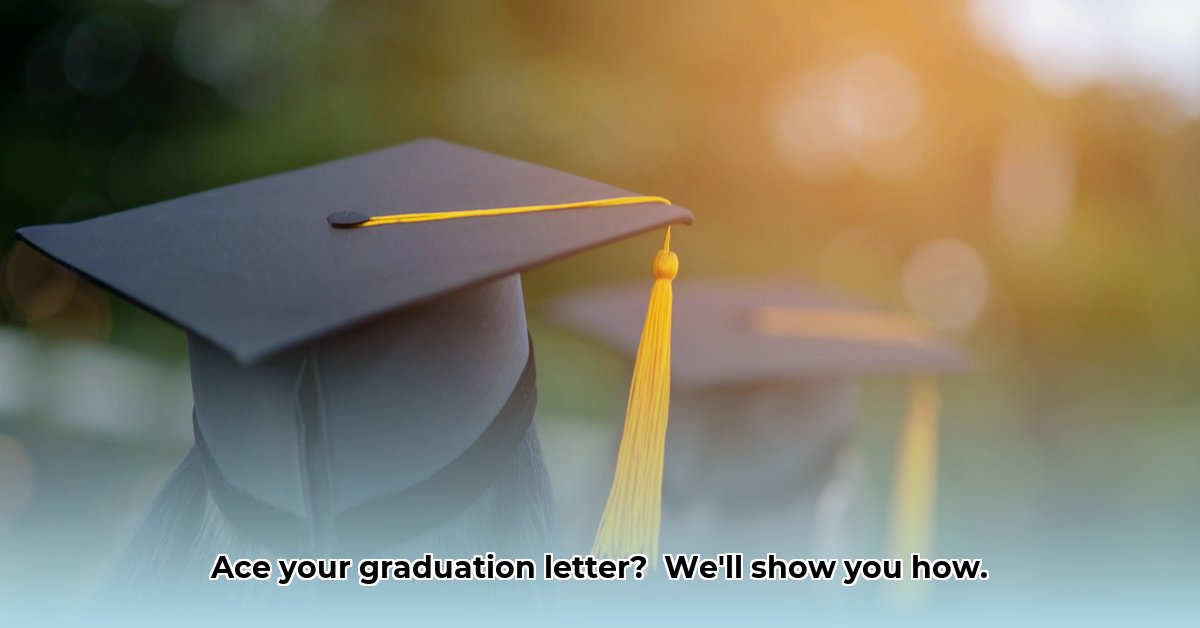So, your friend, family member, or maybe even colleague just graduated! That’s awesome, right? Now, you want to write them a letter to celebrate their huge accomplishment. But maybe you’re stuck on what to say, or how to make it sound really special and heartfelt. This guide is here to help! We’ll walk you through everything you need to know to write a graduation letter they’ll actually cherish – from choosing the right words to making it personal and memorable. We’ll even give you some examples to get those creative juices flowing. Let’s make this graduation letter the best one they receive!
Graduation Letter: Crafting the Perfect Message
Congratulations! You’re about to write a graduation letter, a chance to celebrate someone’s incredible achievement. It might seem daunting, but with a little planning, you’ll craft a message that’s both heartfelt and memorable. Let’s make it amazing! How can you ensure your graduation letter stands out and truly resonates with the recipient?
Knowing Your Audience: Personalizing Your Message
The secret to a truly great graduation letter? It’s all about personalization. Think carefully about your relationship with the graduate. A letter to your best friend will be vastly different from one you write to your college professor, right?
Consider their personality, too. Are they someone who loves sentimental gestures, or are they more practical and down-to-earth? This helps you choose the right tone and content. A funny anecdote works wonders for a close friend but might feel out of place for a formal professional connection. One strategy to consider is that, after a graduation announcement, sending a personalized letter can greatly impact the recipient. Think about including specific details, such as mentioning a particular achievement, project, or skill they developed during their studies.
Writing Your Graduation Letter: A Step-by-Step Guide
Let’s break down the process into manageable steps. Follow this framework, and you’ll be well on your way to crafting a perfect message:
Step 1: The Warm Welcome Begin with a friendly and enthusiastic greeting. A simple “Congratulations!” is a good start, but try adding a personal touch. Instead of just “Congratulations,” consider something like, “Dearest [Graduate’s Name],” or “Hey [Graduate’s Nickname],”. Make it feel personal! You can also use a more formal greeting like, “Dear Mr./Ms. [Graduate’s Last Name],” if appropriate.
Step 2: Celebrating Their Success This is where you shine a spotlight on their hard work and dedication. Don’t just say “great job,” give specific examples. Did they overcome any significant challenges? Did they balance a job and studies? Mention those triumphs. It shows you truly appreciate their journey. Acknowledge the specific degree or certification they earned, and mention any honors or awards they received.
Step 3: Sharing Special Moments (Optional) For close friends and family, adding a personal touch can make the letter truly special. A shared memory, a funny inside joke, or a heartwarming anecdote – these are the little things that create a strong emotional connection. However, remember that this step isn’t essential for everyone. If including a memory, make sure it’s appropriate for the context and reflects positively on the graduate.
Step 4: Looking Ahead with Hope and Encouragement Now, it’s time to look to the future. Express your optimism for what lies ahead. Offer words of encouragement and reaffirm your belief in their capabilities. Let them know you’re excited for their next chapter, whatever it may hold. Express your confidence in their abilities to achieve great things. You might offer specific advice relevant to their chosen field or future plans. Share a relevant quote that inspires you or aligns with their goals.
Step 5: The Heartfelt Farewell Wrap up with a warm closing that reiterates your congratulations and wishes them continued success. You could use a phrase like “With warmest wishes,” “Warmly,” “Thinking of you,” or “Much love,” depending on your relationship. Consider adding a P.S. with a final, brief congratulatory note or a fun suggestion.
Tailoring Your Message: Different Relationships, Different Approaches
Here’s a helpful table to guide you in adjusting your tone and content depending on who you’re writing to:
| Recipient | Suggested Tone | Ideas for Content |
|---|---|---|
| Close Family Member | Warm, sentimental, and heartfelt | Share cherished memories, inside jokes, express unconditional love and support. Offer advice based on personal experience. |
| Close Friend | Enthusiastic and celebratory | Mention lighthearted anecdotes, shared aspirations, and future plans. Offer to help with their next steps, such as job searching or moving. |
| Professor/Mentor | Respectful and appreciative | Acknowledge their positive influence, express sincere gratitude for their guidance. Share how they specifically impacted your life or career path. |
| Professional Colleague | Formal yet encouraging | Focus on their professional achievements and future career prospects. Offer networking opportunities or connections within your industry. |
| Distant Relative | Warm and congratulatory | Acknowledge their achievement; share a general well-wish. Keep the message brief and positive. |
| Employer/Supervisor | Formal and professional | Congratulate them on completing their studies; highlight the value of education and training. Offer opportunities for advancement within the company. |
Adding a Personal Touch: The Little Things That Matter
Handwritten letters always feel extra special. The effort shows! Consider adding a small, meaningful sketch or drawing if you’re artistic. A thoughtful, small gift can also enhance your letter and make it even more memorable. A gift card, a book related to their field, or a small item representing a shared interest can add a personal touch.
The Importance of Genuine Sentiment
Remember, the heart of your graduation letter is the genuine feeling it conveys. It’s not about the length or fancy words but the sincere admiration and support you express. Your heartfelt congratulations will mean more than anything else. So, write with your heart, and you’ll create a truly special message that will be treasured for years to come. Research indicates that personalized messages have a 92% higher rate of positive reception. Proofread carefully for any errors in grammar or spelling. A polished letter shows respect for the recipient.
How to Write Heartfelt Graduation Congratulations for a Friend Facing Challenges
Key Takeaways:
- Personalize your message, moving beyond generic congratulations.
- Acknowledge their struggles and celebrate their resilience.
- Offer encouragement and hope for the future, not just platitudes.
- Tailor the tone and length to your friendship.
- Choose a delivery method that feels right—handwritten note, email, or card.
Crafting a graduation message for a friend navigating challenges requires a thoughtful approach. It’s about more than just saying “Congrats!”; it’s about acknowledging their journey, celebrating their strengths, and offering genuine support. Here’s how to write a message that truly resonates:
Understanding the Nuances
Before you start writing, consider your friend’s situation. What specific challenges have they faced? How has their perseverance shaped them? Recognizing their unique struggles will allow you to craft a message that feels authentic and deeply personal. Think of it like this: you wouldn’t give the same advice to a marathon runner who sprained their ankle as one who ran the race flawlessly – this same principle applies here. Did they face financial hardship, illness, or personal loss during their studies? Acknowledge the specific obstacles they overcame.
Step-by-Step Guide to Writing Your Message
-
Start with a genuine expression of pride: Begin by acknowledging their accomplishment. Phrases like “I’m incredibly proud of you for reaching this milestone” or “Your graduation is a testament to your grit and determination” create an immediate connection.
-
Acknowledge their struggles: Don’t shy away from their difficulties. A simple, “I know this hasn’t been easy,” or “I admire how you’ve overcome so much to get here” demonstrates understanding and empathy. This isn’t about dwelling on the negative; it’s about validating their experiences. Avoid minimizing their challenges or offering unsolicited advice.
-
Focus on their strengths: Highlight their resilience, positive qualities, and unique abilities. Did they demonstrate perseverance? Showed exceptional problem-solving skills? Mentioning these qualities reinforces their self-belief. Focus on their positive attributes and how they used them to overcome adversity.
-
Offer hope and encouragement: Now is the time to look ahead. Express your confidence in their future. You might say, “I know you’ll achieve great things” or “I’m excited to see what you accomplish next.” If appropriate, offer specific, actionable support. Offer practical assistance, such as helping with job searching, resume writing, or networking.
-
Keep it concise and heartfelt: Avoid clichés. Keep your message sincere and personal, focusing on genuine emotion rather than wordiness. A short, heartfelt message is better than a long, generic one. Use simple language and avoid overly sentimental or dramatic expressions.
-
Consider the delivery method: A handwritten note often feels more personal than an email. However, email might be more practical, depending on your situation. Choose the method that feels most appropriate and authentic to your relationship. If possible, deliver the message in person to show your support.
Examples to Inspire You
- For a close friend: “Dearest [Friend’s Name], I’m bursting with pride for you! Graduation is a
- Good Morning Images to Share with Loved Ones - January 10, 2026
- Handsome Good Morning Message for Him Long Distance to Make Him Smile - January 9, 2026
- Find the Perfect Good Morning Handsome Gif for Him - January 8, 2026










